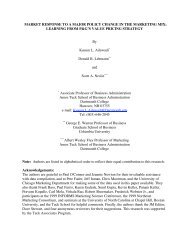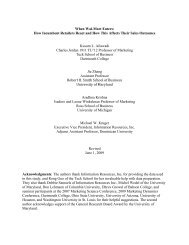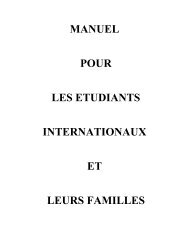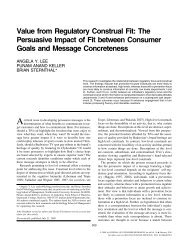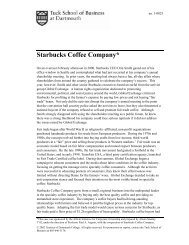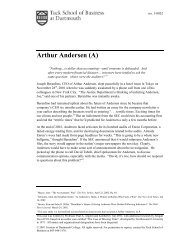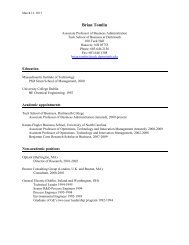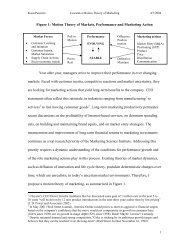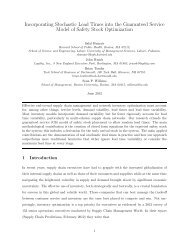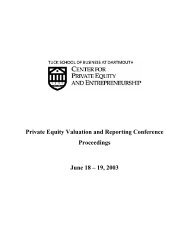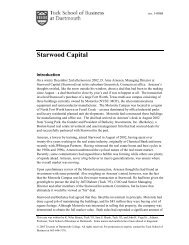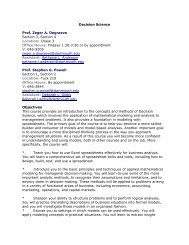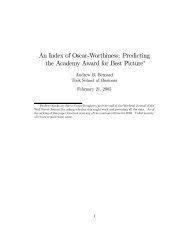tax notes international - Tuck School of Business - Dartmouth College
tax notes international - Tuck School of Business - Dartmouth College
tax notes international - Tuck School of Business - Dartmouth College
You also want an ePaper? Increase the reach of your titles
YUMPU automatically turns print PDFs into web optimized ePapers that Google loves.
OECD<br />
Furthermore, a source country frequently will want<br />
some documentary pro<strong>of</strong> that someone claiming treaty<br />
benefits is in fact entitled to them. Can the payers in<br />
the source country deal with a mountain <strong>of</strong> paperwork<br />
from all <strong>of</strong> the ultimate customers and investors, especially<br />
given that the fund or financial intermediary<br />
looks like one investor on the books <strong>of</strong> the sourcecountry<br />
payers?<br />
If some <strong>of</strong> the investors can benefit under an income<br />
<strong>tax</strong> treaty with the source country and others<br />
cannot, will the source country allow withholding on<br />
only a proportion <strong>of</strong> the payments?<br />
If relief at source is impossible, the investors might<br />
be able to request refunds from the source country. But<br />
what documentation will they need from the fund or<br />
financial intermediary that will be acceptable to the<br />
source country?<br />
Can the fund or financial intermediary generate the<br />
necessary documentation without undue burden? Will<br />
the investors bother to file claims for refunds <strong>of</strong> small<br />
amounts?<br />
These problems may not be too troublesome for<br />
funds with a small number <strong>of</strong> sophisticated investors,<br />
such as the pension pooling vehicles that are coming<br />
into use in Europe. But these issues are daunting for<br />
financial intermediaries with a large number <strong>of</strong> customers<br />
and for retail funds with a large number <strong>of</strong><br />
small investors.<br />
The goal <strong>of</strong> the procedures report is to set forth best<br />
practices for how countries should handle claims for<br />
treaty relief when an investor that is entitled to treaty<br />
relief in its own right does not own the investment directly,<br />
but owns it through a CIV or through one or<br />
more levels <strong>of</strong> intermediaries.<br />
The ICG considered how to reduce costs and ensure<br />
that <strong>tax</strong> administrators’ rules were being followed. Its<br />
conclusions are as follows:<br />
• As much as possible, source countries should allow<br />
treaty relief at source, rather than requiring<br />
investors to file claims for refunds afterward.<br />
• Intermediaries that have been authorized by the<br />
source country should be allowed to make claims<br />
for treaty relief on behalf <strong>of</strong> their customers on a<br />
pooled basis, without having to provide detailed<br />
information on customers for each payment. 1<br />
• Authorized intermediaries should be required to<br />
pass along detailed information about customers<br />
that have claimed treaty benefits to the source<br />
country after the fact so that the source country<br />
can verify that the treaty claims are proper. The<br />
source country would share this information with<br />
1 This suggestion clearly bears a resemblance to the U.S. qualified<br />
intermediary system and the Irish qualifying intermediary<br />
system.<br />
the investor countries so that they can confirm<br />
that the income is being reported properly. 2<br />
• Countries that do not use unique <strong>tax</strong>payer identification<br />
numbers should do so, to allow information<br />
to be properly matched. 3<br />
• Investors should be permitted to claim treaty benefits<br />
based on their own self-certification, rather<br />
than being required to obtain residence certificates,<br />
at least for small accounts. 4<br />
Implications<br />
As stated earlier, the conclusions <strong>of</strong> these reports<br />
have not been accepted by the OECD, and the OECD<br />
does not make <strong>tax</strong> laws. But the OECD’s recommendations<br />
have been very influential on the treaty policies<br />
<strong>of</strong> developed countries. Thus, if these reports are<br />
adopted by the OECD, <strong>international</strong> treaty practice<br />
might move in the direction outlined in the reports.<br />
The Committee for Fiscal Affairs now is considering<br />
the reports, and has invited public comments on them.<br />
Comments are due by March 6.<br />
♦ Matthew Blum, Ernst & Young LLP, Boston.<br />
The author appreciates the assistance <strong>of</strong> Alastair Campbell,<br />
a senior in Ernst & Young’s International Tax Services<br />
Group in Boston.<br />
2<br />
This is not like the U.S. qualified intermediary system because<br />
the U.S. system is designed to respect bank secrecy for<br />
non-U.S. investors.<br />
3<br />
Note that the United States does not require foreign persons<br />
claiming treaty benefits relating to publicly traded investments<br />
(and some other types <strong>of</strong> investments) to obtain U.S. <strong>tax</strong>payer<br />
identification numbers.<br />
4<br />
As is the practice in the United States.<br />
404 • FEBRUARY 2, 2009 TAX NOTES INTERNATIONAL<br />
(C) Tax Analysts 2009. All rights reserved. Tax Analysts does not claim copyright in any public domain or third party content.



